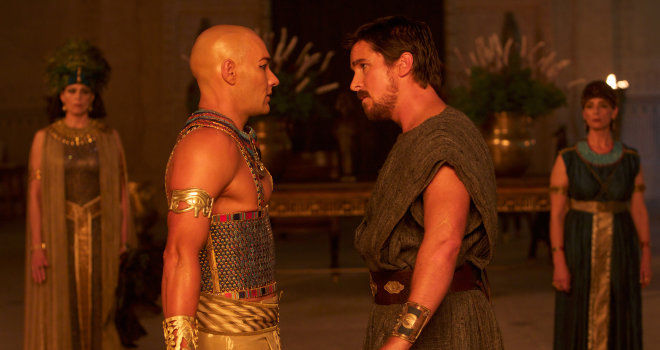
Exodus
Nobody is going to watch Exodus: Gods and Kings for the twists. The story of Moses in Egypt is one that many people know, one that’s been made into a movie several times before (The Ten Commandments and Prince of Egypt are both fantastic). The challenge that director Ridley Scott and Christian Bale faced with this film was to tell such a huge, well-known tale in a way that would make its sizable budget and pre-release controversy worth it.
The story, in case you haven’t heard of it, stems from the Old Testament of The Bible. Bale (American Hustle) stars as Moses, a former Egyptian general who goes on a mission from God to free the Hebrew people from the tyrannical reign of Pharaoh Ramses (Joel Edgerton, Felony).
Bale is at a point in his career where every feature film he puts out deserves at least one viewing, no matter how it looks. He’s at the earned A-watch level. His turn as Moses is good, but not nearly good enough to rank among his best or even to justify watching the 150-minute biblical tale. The movie is instead enjoyable because of its director and its other leading man.
Scott likes big things. The director of Alien and The Counselor is known for his love of huge sets and heaps of special effects. This film does not buck that trend, as it features numerous wide shots that are breathtaking in their unbelievable size and detailed grandeur. Scott’s successful effort in capturing the sheer magnitude of this story may be the most impressive aspect of the film.
All the scenes in the story of Moses that would get a director excited — the war, the plagues, the Red Sea — and all are executed to perfection. The special effects are intense and at times graphic (the plagues get disturbing) and Bale and Edgerton’s performances keep up that in-your-face pace. The best scenes in the movie from an acting standpoint are the ones they share with each other. But of the two, Edgerton may be the brighter star in this movie. Bale’s overall work here is good but not impressive, as one might hope, especially considering the rest of his filmography. Edgerton is exceptional in maintaining the same kind of quiet intensity that made him so great as Tom Buchanan in the 2013 film The Great Gatsby and shows impressive heart in scenes where Ramses cares for his infant son.
The problem with this movie isn’t pivotal emotional scenes or the big stunts — it’s the rest of it. The scenes that transition us from big event to big event are lifeless. The script is not good enough (and too cheesy at times) to carry the film, so it drags in consequence. It seems that Scott focused too much on the beginning and the end, so the middle is a real weakness.
There had been much talk of race surrounding this movie, as Edgerton’s casting especially prompted a discussion about how movies whitewash history. While movies almost always feature inaccuracies (especially in terms of race portrayal) when it comes to historical films, it would be hard to picture many actors of Egyptian or Middle Eastern descent in the role. While Scott’s comments that he couldn’t cast “Mohammed so-and-so from such-and-such” were certainly brusque, it’s certainly true. Anyone who thinks this was anything more than a business decision is naïve about the nature of the entertainment we consume and enjoy.
There is no way this movie would be made without someone like Edgerton opposite Bale. The only argument against him being in this movie would have to center around a lackluster performance, and that is not present here. Too much discussion has clouded the release of this film; I only hope that it won’t overshadow the potential impact it can make as a wonderfully enormous film featuring two passionate performances.



